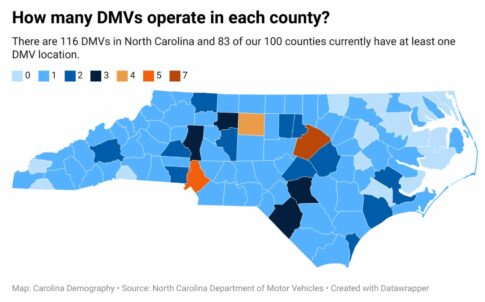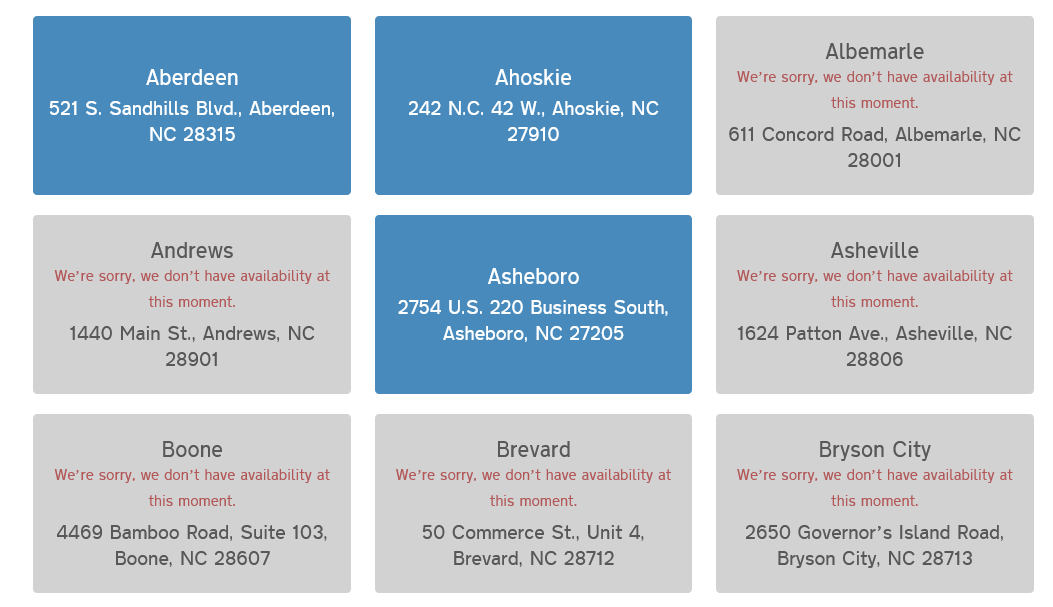How many eligible voters per DMV are there in NC?

After this piece was published, the DMV reached out to Carolina Demography to note that they have implemented several efforts to increase availability of appointments. These include providing walk-in appointments after noon, opening more offices at 7am, and having Saturday office hours for peak season. They also note that every driver license office in the state takes only walk-ins every afternoon.
Starting with the 2023 election, voters in North Carolina will be asked to show photo ID when voting.
The North Carolina Board of Elections has released a list of accepted identifications.
Acceptable forms of ID include:
Any of the following that is unexpired, or expired for one year or less:
Note: A voter 65 or older may use an expired form of acceptable ID if the ID was unexpired on their 65th birthday.
Any of the following, regardless of whether the ID contains an expiration or issuance date:
Two of the forms of accepted ID – the North Carolina Driver’s License and the State ID – require a trip to the North Carolina Department of Motor Vehicles (DMV).
In this post, we examine the geographic distribution of DMVs in North Carolina and what population(s) they serve.
There are 116 DMVs in North Carolina and 83 of our 100 counties currently have at least one DMV location. Some of the DMVs are not open full time. These include locations in Chowan, Robeson, Allegheny, Mitchell, and Stokes Counties. There is also a mobile office in the Lumberton CDL in Robeson County.
However, the populations of these counties vary – so the number of residents per DMV also varies considerably.
The number of eligible voters per DMV (by county) ranges from 8,750 eligible voters per DMV in Alleghany County to 161,860 eligible voters per DMV in Union County. (We'll note that people don't always go to the DMV in their county, but may have to travel further to go to a different DMV.)
In the fastest growing areas of the state, we see fewer DMVs per resident eligible to vote.
The fastest estimated population growth between July 2021 and July 2022 was seen in Brunswick County (5.7%) followed by Currituck (4.4%), Pender (4.2%), Franklin (3.8%), and Lincoln (3.6%).
Of these 5 fastest growing counties, Currituck County does not have a DMV, and the 4 other counties only have 1 DMV.
Although the ratio of eligible voters per DMV in Brunswick County is less than in more populated counties, the infrastructure at DMVs in counties that have experienced large population growth may have trouble accommodating increased demand.
Of the 116 DMVs in the state, 53 have appointments for first time driver's licenses available and only 53 are currently taking new appointments for state ID cards, as of July 26, 2023. Of these 53 DMVs, most are not taking appointments until mid to late October. (These numbers frequently change as appointments open or close and may be different when you look.) There are staffing shortages at many DMVs, as reported by Axios Charlotte.
After this piece was published, the DMV reached out to Carolina Demography to note that they have implemented several efforts to increase availability of appointments. These include providing walk-in appointments after noon, opening more offices at 7am, and having Saturday office hours for peak season. They also note that every driver license office in the state takes only walk-ins every afternoon.

DMVs with availability for State ID cards, as of July 26, 2023.
In 2023, there are four municipal election dates in North Carolina:
This leaves very little time for people to obtain IDs.
Even for potential voters with a DMV in their county of residence, such as Mecklenburg, there are no available appointments within the next 90 days, meaning potential voters will have to travel out of their county of residence to obtain that form of voter ID. Voters in counties without a DMV will have to travel farther.
Unless appointments become available, voters currently without ID in Graham, Clay and Polk counties will have to venture across the state to a DMV accepting appointments if they need to update their driver's license or state ID to use as their voter identification.
There are 17 counties across the state with no DMV, most of which are in the northeastern part of the state. Of these 17 counties, 11 have larger proportions of Black voting-age residents than the state average of 21.57%, including Bertie and Edgecombe, counties with majority Black populations. Three (Polk, Clay, Graham) in the western part of the state, have larger white voting age populations than the state average of 68.78%. Two (Greene, Hyde) have larger Hispanic voting age populations than the state average (4.74%).
A common thread between counties without DMVs is their predominantly rural classification. Twelve of the 17 counties without a DMV have populations classified as 100% rural, according to the 2020 Decennial Census. Thirteen of these 17 counties have poverty rates above the state average of 13.5%, according to the 2021 Small Area Income and Poverty Estimates.
Axios Charlotte recently reported that the DMV plans to roll out 20 kiosks in grocery stores and military bases around the state starting this fall. The first kiosks will be in Mecklenburg and Wake counties. Locations, fees, and rollout dates have not been announced.
Need help understanding population change and its impacts on your community or business? Carolina Demography offers demographic research tailored to your needs.
Contact us today for a free initial consultation.
Contact UsCategories: Elections & Voting, NC in Focus

The Center for Women’s Health Research (CWHR) at the University of North Carolina School of Medicine released the 12th edition of our North Carolina Women’s Health Report Card on May 9, 2022. This document is a progress report on the…

Dr. Krista Perreira is a health economist who studies disparities in health, education, and economic well-being. In collaboration with the Urban Institute, she recently co-led a study funded by the Kate B. Reynolds Foundation to study barriers to access to…

Our material helped the NC Local News Lab Fund better understand and then prioritize their funding to better serve existing and future grant recipients in North Carolina. The North Carolina Local News Lab Fund was established in 2017 to strengthen…
Your support is critical to our mission of measuring, understanding, and predicting population change and its impact. Donate to Carolina Demography today.